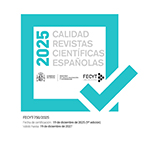“El gigantesco sacrificio a los dioses oscuros”: las visiones de Slavoj Žižek y Paul Celan sobre el mal, la oscuridad y un dios en fuga en las repercusiones de la Shoah
Resumen
the present paper establishes a dialogue between Paul Celan’s poetry and Slavoj Žižek contemporary thought, centered on the Shoah and its repercussions as its focal point. By means of the analysis of three aspects in particular –the notion of evil, the sense of darkness and the idea of an absconding God– it also approaches questions of the poetic representability of the Shoah and the aesthetic accessibility of Celan’s poetry, which eventually leads to a slightly broader conclusion on the role and importance of aestheticization of trauma, in the lacanian sense, in general.Descargas
Descarga artículo
Licencia
La Revista de Filología Románica, para fomentar el intercambio global del conocimiento, facilita el acceso sin restricciones a sus contenidos desde el momento de su publicación en la presente edición electrónica, y por eso es una revista de acceso abierto. Los originales publicados en esta revista son propiedad de la Universidad Complutense de Madrid y es obligatorio citar su procedencia en cualquier reproducción total o parcial. Todos los contenidos se distribuyen bajo una licencia de uso y distribución Creative Commons Reconocimiento 4.0 (CC BY 4.0). Esta circunstancia ha de hacerse constar expresamente de esta forma cuando sea necesario. Puede consultar la versión informativa y el texto legal de la licencia.










